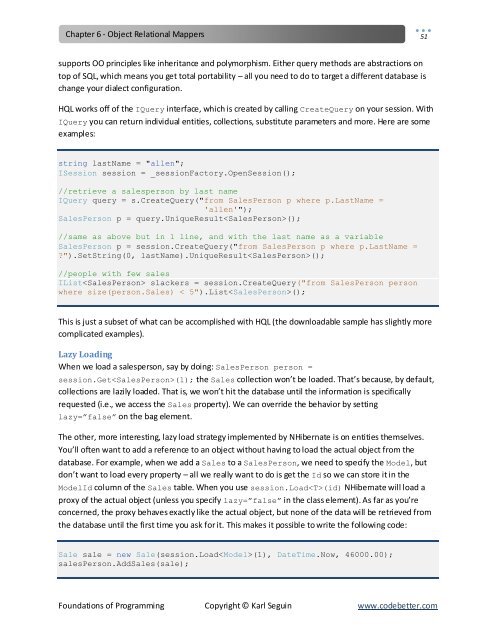Foundations of Programming - Karl Seguin
Foundations of Programming - Karl Seguin
Foundations of Programming - Karl Seguin
Create successful ePaper yourself
Turn your PDF publications into a flip-book with our unique Google optimized e-Paper software.
Chapter 6 - Object Relational Mappers<br />
supports OO principles like inheritance and polymorphism. Either query methods are abstractions on<br />
top <strong>of</strong> SQL, which means you get total portability – all you need to do to target a different database is<br />
change your dialect configuration.<br />
HQL works <strong>of</strong>f <strong>of</strong> the IQuery interface, which is created by calling CreateQuery on your session. With<br />
IQuery you can return individual entities, collections, substitute parameters and more. Here are some<br />
examples:<br />
string lastName = "allen";<br />
ISession session = _sessionFactory.OpenSession();<br />
//retrieve a salesperson by last name<br />
IQuery query = s.CreateQuery("from SalesPerson p where p.LastName =<br />
'allen'");<br />
SalesPerson p = query.UniqueResult();<br />
//same as above but in 1 line, and with the last name as a variable<br />
SalesPerson p = session.CreateQuery("from SalesPerson p where p.LastName =<br />
?").SetString(0, lastName).UniqueResult();<br />
//people with few sales<br />
IList slackers = session.CreateQuery("from SalesPerson person<br />
where size(person.Sales) < 5").List();<br />
This is just a subset <strong>of</strong> what can be accomplished with HQL (the downloadable sample has slightly more<br />
complicated examples).<br />
Lazy Loading<br />
When we load a salesperson, say by doing: SalesPerson person =<br />
session.Get(1); the Sales collection won’t be loaded. That’s because, by default,<br />
collections are lazily loaded. That is, we won’t hit the database until the information is specifically<br />
requested (i.e., we access the Sales property). We can override the behavior by setting<br />
lazy=”false” on the bag element.<br />
The other, more interesting, lazy load strategy implemented by NHibernate is on entities themselves.<br />
You’ll <strong>of</strong>ten want to add a reference to an object without having to load the actual object from the<br />
database. For example, when we add a Sales to a SalesPerson, we need to specify the Model, but<br />
don’t want to load every property – all we really want to do is get the Id so we can store it in the<br />
ModelId column <strong>of</strong> the Sales table. When you use session.Load(id) NHibernate will load a<br />
proxy <strong>of</strong> the actual object (unless you specify lazy=”false” in the class element). As far as you’re<br />
concerned, the proxy behaves exactly like the actual object, but none <strong>of</strong> the data will be retrieved from<br />
the database until the first time you ask for it. This makes it possible to write the following code:<br />
Sale sale = new Sale(session.Load(1), DateTime.Now, 46000.00);<br />
salesPerson.AddSales(sale);<br />
<strong>Foundations</strong> <strong>of</strong> <strong>Programming</strong> Copyright © <strong>Karl</strong> <strong>Seguin</strong> www.codebetter.com<br />
51


